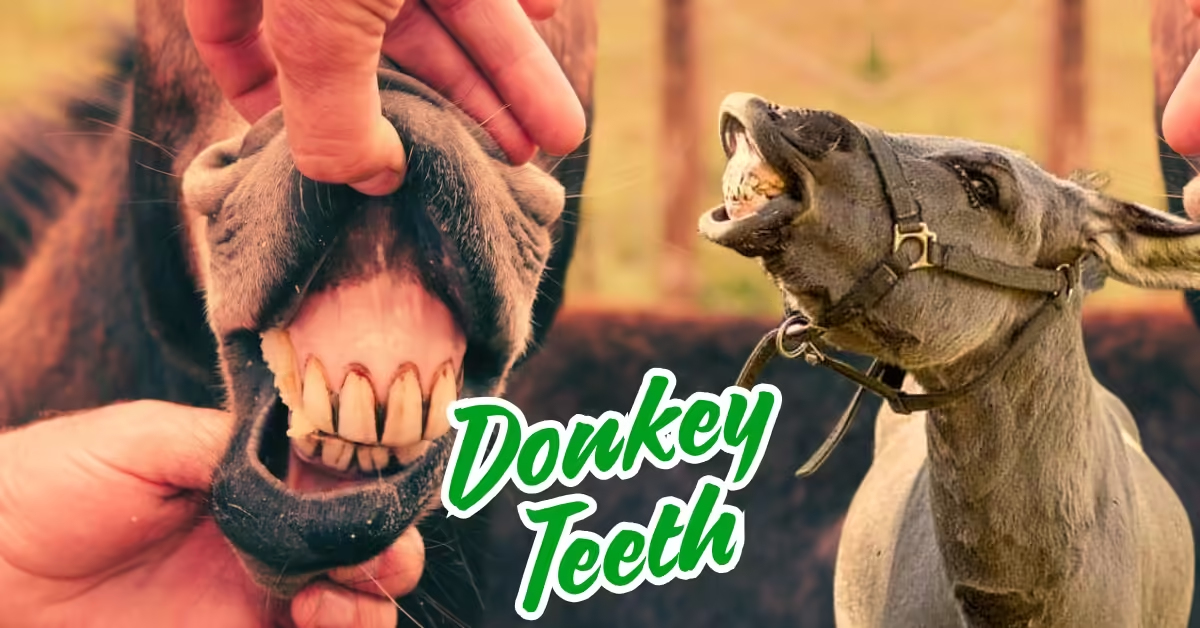When you think of donkeys, their teeth might not be the first thing that comes to mind, but they play a crucial role in the animal’s health and well-being. Donkey teeth are unique and complex, much like those of other equids, and proper dental care is vital for their overall health. In this article, we’ll explore everything you need to know about donkey teeth, from their anatomy to common dental issues and how to care for them. By understanding more about your donkey’s teeth, you can ensure they live a long, healthy life.
1. Donkey Teeth Anatomy: Understanding Their Dental Structure
The dental structure of donkeys is quite similar to that of horses, although there are some differences. Donkeys are hypsodont animals, meaning their teeth continuously grow throughout their lives. This is essential because donkeys spend a lot of time chewing fibrous plant material, which causes significant wear on their teeth.
- Incisors: Donkeys have 12 incisors at the front of their mouth—six on the top and six on the bottom. These are used primarily for cutting and grasping food, such as grass and hay.
- Molars and Premolars: The back teeth, which include 12 premolars and 12 molars, are used for grinding food into small, digestible pieces. These teeth are wider and flatter compared to the incisors, allowing the donkey to efficiently process rough forage.
- Canine Teeth: Male donkeys, or jacks, usually have canine teeth, which appear between the incisors and the premolars. These teeth are typically more developed in males than in females.
Donkey teeth are also deeply rooted in their jaws, which allows them to continuously grow throughout the donkey’s lifetime, compensating for the wear caused by chewing tough fibrous plant material.
2. Common Dental Problems in Donkeys and How to Prevent Them
Like all animals, donkeys are prone to dental issues if not properly cared for. Some of the most common problems include:
- Overgrown Teeth: Because donkey teeth grow continuously, if the teeth aren’t worn down evenly, they can become overgrown. This can lead to sharp edges or points that cause discomfort or injury to the donkey’s mouth.
- Diastema (Gaps Between Teeth): Gaps can form between a donkey’s teeth, allowing food to become trapped and potentially leading to infection or gum disease.
- Tooth Abscesses: Infections can develop in the roots of donkey teeth, leading to abscesses. These can cause swelling, discomfort, and serious health problems if left untreated.
Prevention: Regular dental check-ups by a veterinarian or equine dentist are essential to catch and treat these issues before they become serious. Floating (filing down) the teeth, which we’ll discuss later, is an important part of preventing overgrowth and sharp edges.
3. How to Care for Donkey Teeth: Tips for a Healthy Mouth
Caring for your donkey’s teeth is critical to their overall health. Here are some key tips to ensure their teeth remain healthy:
- Regular Dental Exams: Donkeys should have a dental check-up at least once a year. A professional equine dentist or veterinarian will inspect the donkey’s teeth for sharp edges, overgrowth, or other potential issues.
- Floating the Teeth: Floating is a common procedure where the sharp points of the teeth are filed down to prevent discomfort and injury. We’ll cover more about this process later.
- Proper Diet: A diet high in fibrous plant material, such as hay or grass, is ideal for donkeys. This roughage helps naturally wear down their teeth and reduce the risk of overgrowth.
- Monitoring: Keep an eye on your donkey’s eating habits. If they start dropping food, eating slowly, or losing weight, it could be a sign of dental problems. Early detection is key to preventing serious issues.
By providing regular care, you can prevent many of the common dental issues donkeys face.
4. The Importance of Floating Donkey Teeth: What It Is and Why It Matters
Floating is a critical part of donkey dental care. It involves using a specialized tool to file down the sharp points or uneven surfaces on a donkey’s teeth. Since donkeys’ teeth continue to grow throughout their life, uneven wear can create sharp edges that cause discomfort, ulcers, and difficulty chewing.
Here’s why floating is important:
- Prevents Injuries: Overgrown or sharp teeth can cause painful sores inside a donkey’s mouth. These sores can lead to infection if not addressed.
- Improves Digestion: When a donkey’s teeth are properly aligned, they can effectively chew their food, ensuring it is broken down adequately for digestion. Improperly chewed food can lead to digestive problems and colic.
- Promotes Weight Maintenance: Donkeys with dental issues may struggle to chew their food properly, leading to weight loss. Regular floating helps keep their teeth in good condition, ensuring they can eat properly and maintain a healthy weight.
Most donkeys need their teeth floated once or twice a year, depending on their age and the condition of their teeth. Regular check-ups are essential to determine the need for floating.
5. Signs Your Donkey May Have Dental Issues
Donkeys can be quite stoic, meaning they may not show obvious signs of discomfort or pain, even if they have dental issues. Here are some signs that could indicate your donkey is experiencing dental problems:
- Dropping Food: If your donkey is dropping a lot of food while eating, it may be struggling to chew due to dental pain or uneven teeth.
- Weight Loss: Unexplained weight loss can be a sign of dental issues, especially if the donkey isn’t able to chew food properly and extract nutrients.
- Bad Breath: Bad breath is often a sign of infection or decay in the mouth, which may indicate an abscess or gum disease.
- Facial Swelling: Swelling along the jawline or cheeks can indicate an abscessed tooth or other serious dental issue.
- Behavioral Changes: If your donkey becomes irritable, refuses to eat, or shows discomfort while eating, these could be signs of dental pain.
If you notice any of these signs, it’s important to have a vet or equine dentist examine your donkey’s teeth as soon as possible.
6. Aging Donkeys: How Teeth Change Over Time
As donkeys age, their teeth naturally wear down and change. Here’s what you can expect as your donkey gets older:
- Tooth Wear: Over time, a donkey’s teeth will gradually wear down. Older donkeys may have smoother, shorter teeth, which can affect their ability to chew tough forage.
- Loose or Missing Teeth: In elderly donkeys, it’s common for teeth to become loose or fall out. This can make it difficult for them to eat fibrous plant material, so softer foods may be necessary.
- Dental Care for Older Donkeys: Older donkeys may require more frequent dental care, including floating, to ensure they can still chew comfortably. Additionally, feeding soft, easy-to-chew food like soaked hay pellets can help maintain their health.
By paying close attention to your donkey’s teeth as they age, you can help prevent discomfort and ensure they continue to thrive in their later years.
Visit My Read Magazine for fresh insights, trending stories, and expert tips on everything you love—start exploring today!
Conclusion
Donkey teeth are an integral part of their health and well-being. Just like horses, donkeys rely heavily on their teeth to grind fibrous food for digestion. Without proper dental care, common issues like overgrown teeth, sharp edges, and infections can severely impact their overall health and quality of life. Regular dental check-ups, floating, and attentive observation of eating habits are essential in preventing serious dental issues. By understanding the anatomy and aging process of donkey teeth, and providing the appropriate care, you can ensure your donkey remains happy, healthy, and pain-free for many years.
FAQs About Donkey Teeth
- How many teeth do donkeys have?
Adult donkeys typically have 36 to 44 teeth, including incisors, premolars, and molars. Male donkeys may also have canine teeth, which females often lack. - Do donkey teeth grow continuously?
Yes, donkey teeth are hypsodont, meaning they grow continuously throughout their lives to compensate for the wear caused by chewing fibrous plant material. - What is the purpose of floating donkey teeth?
Floating involves filing down sharp edges or overgrown teeth. This helps prevent discomfort, sores, and chewing difficulties caused by uneven tooth wear. - How often should donkeys have dental check-ups?
It’s recommended that donkeys have their teeth checked once or twice a year by a vet or equine dentist to prevent overgrowth and detect any potential dental issues early. - What are the signs of dental problems in donkeys?
Signs include dropping food, weight loss, bad breath, facial swelling, and behavioral changes such as irritability or refusal to eat. - What is diastema in donkeys?
Diastema refers to gaps between a donkey’s teeth, which can trap food and lead to gum infections or dental disease if not addressed. - Can donkeys lose their teeth as they age?
Yes, older donkeys may experience tooth loss or loosened teeth, which can make chewing difficult. Softened food may be needed to accommodate aging donkeys with dental problems. - How can I prevent donkey dental problems?
Preventive care includes regular dental exams, floating, providing a fibrous diet to naturally wear down teeth, and monitoring eating habits for signs of discomfort. - What is the role of a donkey’s incisors?
Incisors are the front teeth, used by donkeys to cut and grasp food, such as grass and hay, before it is moved to the back molars for grinding. - Are dental problems more common in older donkeys?
Yes, older donkeys are more prone to dental issues like tooth wear, loss, and overgrowth, which require more frequent check-ups and softer diets.

Joseph Bush is a seasoned writer and researcher with over 7 years of experience covering a wide range of general topics, from lifestyle and technology to business and current events. He is dedicated to producing fact-checked, reader-friendly content that informs, engages, and empowers readers.
Throughout his career, Joseph has followed strict editorial guidelines, relied on reputable sources, and ensured every article meets the highest standards of accuracy and clarity. His expertise spans multiple fields, allowing him to explain complex topics in a way that’s easy to understand.
Passionate about continuous learning, Joseph stays updated on industry trends and best practices to deliver trustworthy, well-rounded insights. Readers can rely on his work for its credibility, depth, and real-world relevance.




